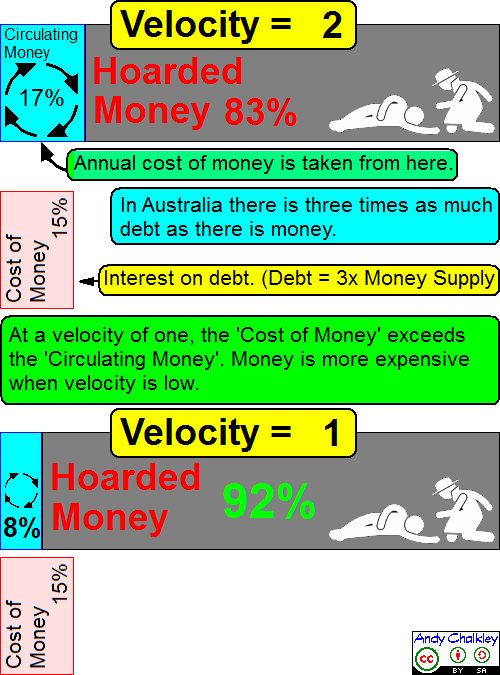
The task here is to reduce taxes that are helpful to hoarding and provide government tax collection from areas that do the least damage to the economy and the wealth and prosperity of the citizens of the nation. Money hoarding needs to stop for the economy to improve. Hoarded Money is left entirely untouched and untaxed. Money that plays truant escapes taxation. It is not the money that suffers, but the whole of society by not allowing citizens the benefit of the potential transactions. There are tax regimes that don’t discourage trade and economic activity. You will be unlikely to see them in your lifetime because of the scaremongering by those with enough money to modify Public Opinion, which happens to include your opinion. How much of your opinion has been modified by those with the ability to modify your opinion?
Our money system is also incredibly expensive. Here is a silly calculation. At a velocity of two, $1000 in circulation requires $6000 in Money Supply which holds $18000 in debt, which at 5% interest costs $900 in interest per year.

Hoarded Money is static and is owned by persons with ‘more money than they need’. You would have to be very inventive to get this off them. They will already have adjusted the thinking of the political parties to tax anything else but their Hoarded Money.
Our taxation system stifles trade. Under a sales tax regime, a percentage is removed at each transaction which heavily damps trade and real wealth creation. The same happens with income tax. It rapidly destroys trade and wealth creation. The problem of taxing transactions is visible in this graph. This is not proof that increased transaction taxes decrease tax collection, but it is enough to seriously challenge the talking heads that believe that an increase in income tax rate will result in greater tax collection. You should be able to find the points in this graph where decreased income tax rate, increased the tax collected.

Please do not move on until you have found the two points on the graph where tax rate reduction increased the tax collection. The reverse is not so clear.
I start with the smaller side issues before tackling the big issues:
1: Minor Items
Cutting subsidies to all polluting industries. It is appropriate to put a price on pollution, but a start is cut rewards polluters in the form of tax breaks and subsidies. Subsidies directed towards the discovery and exploitation of new fossil-fuel reserves are particularly wasteful and damaging. Governments of the G20 countries are estimated to be spending $88 billion each year in subsidies for exploration for fossil fuels. [3] Every G-20 country is participating in the exploration subsidy fest. The host government for the Brisbane summit spends some $3 billion annually. The US has increased funding for exploration to more than $5 billion. [4] Britain provides around $1.2 billion, mainly as tax breaks for North Sea oil exploration. [4]
State-owned energy companies in India, Brazil, and China, and are active in exploration. Russia’s Gazprom gets tax breaks to support investment in the delicate ecological areas of the Arctic. [4]
Fossil fuel companies are benefitting from global subsidies of $5.3trillion each year, according to a working report by the IMF. [5]
The large banks make big profits thanks to a lack of competition. A tax on these super profits would help.
With the use of tax loopholes and clever accountants, Kerry Packer reduced his effective tax rate so he paid a lower tax rate than his gardener. “The Buffet Rule” would put a cap on loopholes for high-income earners. According to data released by the Australian Tax Office, 55 people earning more than $1 million per year paid no tax for the 2012-13 tax year. [7] This is from the White House website:
“The Buffett Rule is the basic principle that no household making over $1 million annually should pay a smaller share of their income in taxes than middle-class families pay. Warren Buffett has famously stated that he pays a lower tax rate than his secretary, but as this report documents, this situation is not uncommon. This situation is the result of decades of the tax system being tilted in favor of high-income households at the expense of the middle class. Not only is this unfair, it can also be economically inefficient by providing opportunities for tax planning and distorting decisions. The President has proposed the Buffett Rule as a basic rule of tax fairness that should be met in tax reform. To achieve this principle, the President has proposed that no millionaire pay less than 30 percent of their income in taxes.
The average tax rate paid by the very highest-income Americans has fallen to nearly the lowest rate in over 50 years. The wealthiest 1-in-1,000 taxpayers pay barely a quarter of their income in Federal income and payroll taxes today – half of what they would have contributed in 1960. And, the top 400 richest Americans – all making over $110 million – paid only 18 percent of their income in income taxes in 2008.” [6]
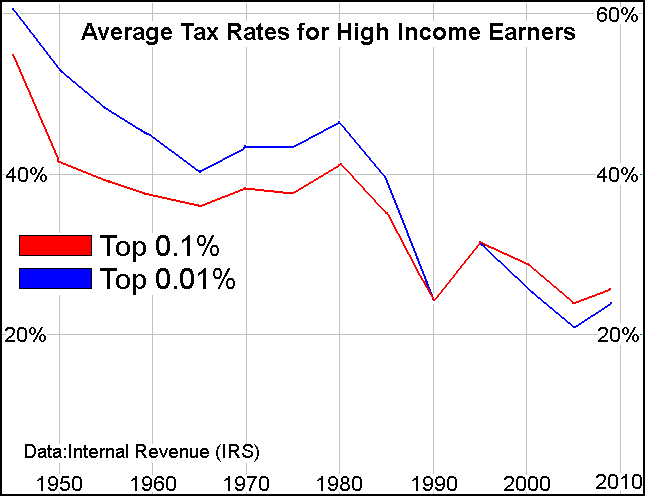
Many rich citizens hire lawyers and accountants to take advantage of loopholes and procedures to minimise their tax. No household with an annual income exceeding $1 million should pay a smaller percentage of income in taxes than a middle-class family. The President has proposed that no millionaire should pay less than thirty percent of their income in taxes.
Concessions on capital gains tax predominantly benefit the wealthy, who have a larger proportion of their income from investments.
The excise was originally intended as a tax on road usage. There is an argument that diesel used off-road on mining sites shouldn’t be taxed. However, we should tax all items that need to be minimised and conserved. Fossil fuel will not last forever. We need to minimise its use. It is inappropriate to sell fuel for little more than the cost of digging a hole in the ground. It is a naturally occurring resource that has taken millions if years to form and is being used faster than it is replenished. It can be used, but only by paying for its future replacement.
The best explanation of this is given by ‘Kick It Over’ at kickitover.org
Lobbying is legalised corruption.
When a government sells a national asset, the proceeds are treated as income. It is the type of idiotic accounting that not even the smallest business would use. If a $4 billion asset is sold for $1 billion, it is treated as an income of $1 billion not a loss of $3 billion. The private interests then take advantage of any monopoly arrangement and adjust the situation to take maximum advantage, sometimes billing items back to the government, seeking concessions or hiking prices to the public. Sales of public assets may be against the wishes and interests of the citizenry.
Restrict the availability of loans for speculation. This can be done by regulation or through the tax system. Tax on unearned income should be far higher than on earned income, perhaps by a factor of three.
Make lobbying a crime. Lock up politicians accepting sweeteners. Ban ex-politicians from lobbying on behalf of the industries they controlled. Ban politicians from receiving time delayed bribes from corporations.
Government tends to group the legislative, executive and judiciary functions of an authority into one regulatory agency. This makes it easy for it to become influenced and corrupted by the industries it regulates. Regulations are given complexity is to hide the loopholes. There are too many avenues for industries to influence the agencies that are supposed to regulate them. William Sanjour has a good article: Designed to Fail: Why Regulatory Agencies don’t Work” [9]
Change school mathematics syllabus that the teaching of compound interest includes the impossibility of paying the interest.
When I was a mathematics teacher, I taught compound interest, but I did not spot that compound interest was biblical usury renamed and the textbooks do not teach the mathematical logic that the debt becomes unpayable when aggregated for the whole nation. It is not payable, partly because there is less money than debt and also because any attempt to repay the debt would cause the removal of the essential circulating medium.
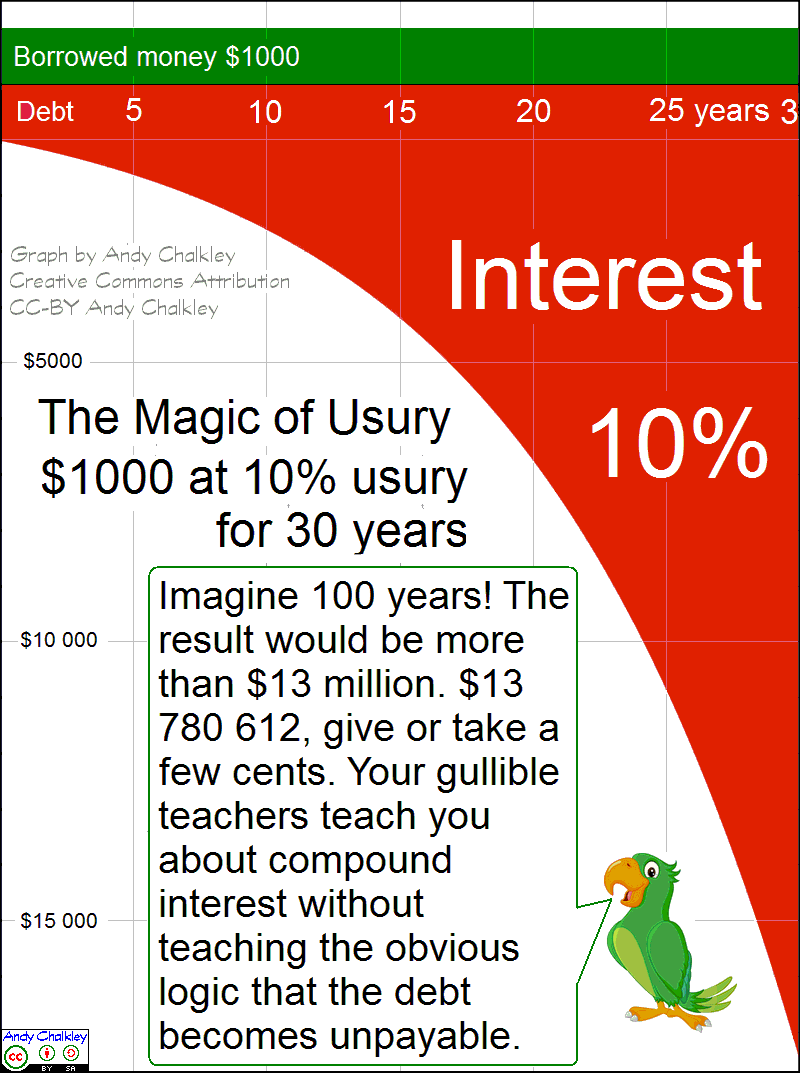
Reform tax concessions for negative gearing. Negative gearing allows persons to defer tax on the profit from the rise in the value of a property to a future date. No tax is payable on the windfall gains until the date the property is sold which may be an indefinite postponement. This gives speculative purchasers a buying advantage when bidding against citizen homeowners which usually means young couples. This has numerous consequences beyond the lack of revenue for government and the profits available to the speculator. It creates a class of renters. When I arrived in Australia in 1976, 96% of home loans went to owner-occupiers which basically means young couples. In 2015, the figure was 64%, which means that over one-third of home loans go to persons purchasing their second, third, fourth, fifth, sixth … house. These speculators get a tax advantage, the magnitude of which increases with their tax rate. The renters become a class that is more dependent on government with little hope of being able to support themselves into retirement. This is altogether a huge loss to the government and the citizens all for the gain of those on higher tax rates.
Home ownership brings substantial social benefits, not only for the family, but also for the local community and the nation. It influences the performance of children in schools, physical health, psychological health, personal satisfaction, self-esteem, happiness, house maintenance, district maintenance, tidiness, family stability, reduces inequality, lowers housing costs in retirement, is an asset that can be liquidated in retirement and more. Homeownership will bring less dependence on the state and can be considered one of the essential elements of freedom. It gives a sense of personal ownership and a sense of ownership into the nation.
A high homeownership rate should be a national policy of high priority. Situations where the houses are owned by private or publicly owned enterprises, will result in less than ideal neighborhoods. It is inappropriate that some own extra houses to the exclusion of others. It is a house that is effectively priced out of the reach of a prospective house owner by the superior buying or borrowing power of speculators and this often occurs because of advantaged tax arrangements granted to investor-speculators. A house should not be used as an item to make a personal profit. A house should become a home for a family and become a physically and financially secure and safe environment to raise children. We can never be a prosperous, safe and trouble-free nation whilst houses are owned by other than those who are living in them. Homeownership is the key factor to make quality neighborhoods.
I have met and spoken with many 23-year-olds and one memorable comment was: “Andy, we despair at the thought that we may never be able to buy a house.” Homeownership was always part of the ‘Great Australian Dream’. We are failing our young by allowing houses to become unaffordable. You can blame the young for whatever you like, but it is not their fault that the adults have priced houses out of the reach of the young. I take two months off each year and make a lap of the world using cheap air tickets using skyscanner.net. I often ask the young in their twenties: “Can you buy a house in the town in which you were brought up?” The answer is always negative. This is wrong and one of the driving forces in my study on what has gone wrong in economics. It is difficult to respect an economic system and those that gain a living from it when the next generation cannot buy houses.
Buying houses on favorable tax arrangements is the very essence of exploitation by those that don’t even realize they are exploiting those who don’t even realize that they are being exploited.
The restriction on foreign ownership is not done on the basis of discriminating against foreigners, but on the basis that houses are homes for people residing in the nation. It must not be forgotten that houses are homes for people, not investments for gain.
Almost a third of large Australian private firms paid no tax in 2013-14. [8] [10] Many companies exploit loopholes in Australia’s tax laws by shifting profits and losses to overseas companies. Making it illegal for companies operating in Australia to pay bribes anywhere in the world.
Remove land transfer levies. They are taken from the transaction involved with the selling of land. The downsizing by elderly persons assists the availability of housing to the young.
Stop the use of lawyers as a means to destroy and ‘wear-down’ smaller entities through corporate warfare. The legal system is designed to ensure justice, but it is being used for gain.
Be aware that superannuation funds and compulsory savings are slush funds for corporations whilst small entrepreneurs have no access to this compulsory saving.
Compulsory savings can be used as collateral for house loans and business development. What is the point in a compulsory savings scheme when the best thing to have at retirement is your own home?
This is a sideline and non-essential component of the solution. Alternative currencies are currencies that have restricted usage in a local area or in a restricted environment. Alternative currencies aid local business by allowing the local currency to flow freely around the local district. Never forget that the value of a $20 note is not the face value of the note, but is the sum total of all the transactions enabled by the note. Money flowing around a local community aids the local community. National currency does not always spread evenly throughout the nation, creating a money shortage in some areas. Local money can be useful to fill this shortage. Local money can only be used locally, as it does not affect the nation but allows local trade, thus filling up the local void.
Alternative Currencies also acts as a buffer when a national currency collapses. To this end, the currency may be linked to the national currency, but better is might be linked to some other measurable value which might be hours of work or energy or any commodity that has a meaningful value. This value could even be a dozen eggs or a loaf of bread or a combination of items. In the event of a collapse of the national currency, the Alternative Currency needs to be decoupled from the national currency. Legislation needs to be added to facilitate any local area wishing to create its own local currency.
Increased transparency so that bank clients can see what industries their bank supports. Customers may wish to know whether they are assisting in unwanted wars or inappropriate industries. Many would wish their money to be lent locally so that it enhances the local area and creates employment.
Make financial institutions liable for damage, hurt, and suicide on farm enterprises. This includes farm suicide through the recall of loans and business failure through the modification of loans.
Restrict the availability of loans for speculation. This can be done by regulation or through the tax system. Tax on unearned income should be far higher than on earned income, perhaps by a factor of three.
In 1933 President Roosevelt introduced legislation to stop home and farm foreclosures, with the reasoning that homeownership was needed as a ‘guarantee of social and economic stability’ The Australian Federal Government passed the War Precautions Act 1916 to stop foreclosures. Every state in Australia enacted legislation during the Depression to stop home and farm foreclosures. The Federal Government passed the Farmers’ Relief Act, which provided money to the states for the relief of farmers. The intent was to protect the Common Good by ensuring debtors were not crushed by creditors.
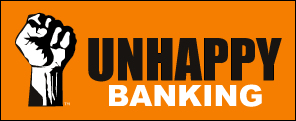
It is still necessary for homeowners and farmers to be protected from the predatory actions of banks. Banks can increase interest rates at will and cause farm foreclosure. The farm is using land provided by nature to produce food for the city folk. The viability of a farm depends on its ability to pay interest to a bank rather than its ability to produce food. The price of houses is dependent on the availability of work in the region, so work is the factor that determines whether one can move into a town. The availability of work depends on the economic activity of the nation which depends on the Money Supply of a nation which is dependent on the lending habits of the banks. Thus, a cutback caused by banks allows banks to foreclose. It is not in the nation’s good to allow bank initiated evictions that were caused by a bank-induced recession.
For the most part, derivatives are unnecessary and allow banks to use devious deceptive practices that are not to the benefit of society.
A person that is ‘Short Selling’, sells a stock that they do not own. They buy the stock at a later time when the stock has fallen in price. They are betting against a price rise. They are anticipating a fall in the stock price. To achieve this the ‘Short Seller’ borrows the stock from a broker and purchases a replacement stock when the price falls. This practice should be banned.
They should lose their banking license if they invest for their own profit. If a bank wishes to trade for its own profit, it should be split off into a separate company which does not have a bank license.
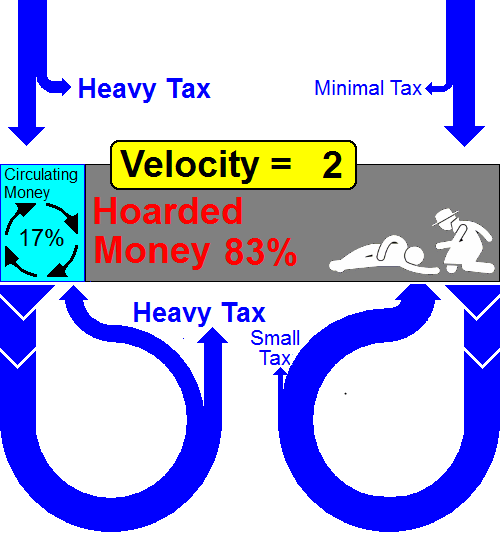
2: Reduce Economy Damaging Taxes
Sales tax for most items should be reduced to zero. Sales Tax should only be used to discourage pollution, degradation, and wastage. Sales Tax on labour should be reduced to zero. Many businesses supply services to the government, yet they have to pay sales tax before the government has paid the business. Tax collection times must be in line with government payment times. There is a bizarre situation under accrual accounting where tax is due to the government before the government has paid the money on which the tax is due.
Depreciation of business assets turns an Income Tax into a Profit Tax. The problem here is that an expanding business that reinvests part of its income into new plant and equipment has its tax deductions for its expenditures delayed into the future. This is a disincentive to expansion and pushes expanding businesses towards the money lenders.
Income tax needs to be reduced for individuals. Tax on ‘earned income’ needs to be taxed at a lower rate than ‘unearned income’.
Current business Income Tax is calculated as a profit tax rather than the income the business owner removes from the business for the purpose of feeding the family. The main culprit is the depreciation of purchased assets. Money has been spent to magnify the business, but tax mercy is not allowed until many years in the future. This pushes expanding businesses to the moneylenders. The tax laws are working in the favour of the banks.
Businesses with fluctuating annual income have no method of smoothing the cycle. If a business owner makes $50 000 one year and $0 the next year, the business pays a higher tax than in a situation where he earns $25 000 each year.
Give business flexibility in paying tax. Encourage business to expand and employ through the tax system.
Expanding businesses need to delay tax or be excused of tax.
Be aware that reducing the income tax rate often increases the amount of tax collected.


You might see, in the above graph, the inappropriate way that tax is collected. The first four taxes are an impediment to the ability of money to perform transactions. These four need to be progressively reduced and other taxes introduced and increased. Currently, we tax very heavily on transactions that involve goods or labour but charge no tax on transactions that involve speculation or hoarding. We need to bias our taxes towards the hoarding, speculation and the use of resources including land and minerals. Remember that mining depletes a resource, quality farming without pesticides, chemicals, and land degradation, does not deplete the land.
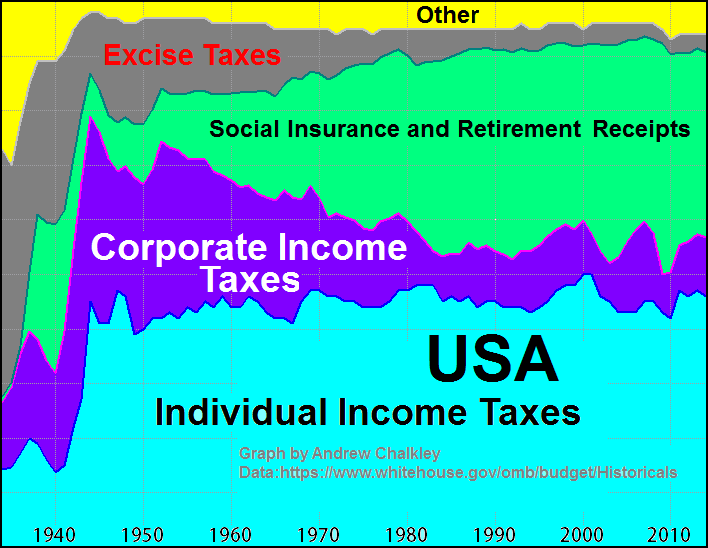

Land Taxes, Local Government Rates, fuel taxes, resource taxes generally, taxes on things that are harmful to the economy, taxes on items that are harmful to health, taxes on Hoarded Money, all need to take a far greater share. A minor Transaction Tax needs to be introduced to capture all those hoarding and speculation transactions and replace the harmful sales tax. A generous government retirement plan would help reduce the need to hoard. Death and inheritance taxes are needed, but not in a manner to damage family farms and businesses. Before you shout at me, consider if, for most people, the tax on income reduces by $10 000 and tax on sales is reduced by $3000 but tax on land and rates is increased by $7000. Besides an overall decrease in tax, the rate of transactions will increase dramatically, enabling all to have greater prosperity.
Businesses that purchase assets used to expand their business are required to claim the expense over numerous years in a process called depreciation. An example: A small business purchases a sausage machine for $10 000. The business has spent $10 000 but can only claim it as a tax deduction over numerous years. That is $10 000 less the business owner has to spend as income. This tends to push expanding businesses towards bank borrowing. For example: A business has a profit of $30 000 and pays $10 000 tax (33% tax rate). The business used $10 000 from the $20 000 to buy the sausage machine late in the year. The business owner only has $10 000 to feed the family, yet he is trying to expand the business to feed the village. The current income tax is misnamed and is actually a ‘profit tax’. This stifles small business expansion and thus employment opportunity. The reverse needs to happen. Not only should the expanding business be able to charge the $10 000 sausage machine immediately, the business should get a tax deferral to encourage expansion and thus employment. The government nor the people gain by destroying the hand that feeds them and in this case, it is the village butcher who will not expand in line with the needs of the village. The sausage machine is counted as profit by bean counters and those walking zombies who sit in tax offices destroying businesses. I used to express this as ‘You cannot eat wheel nuts.’ to people working in the transport industry. When I had an expanding business, I was always short of money. As soon as I got older, and wound things back somewhat, I had spare money. Quite ridiculous. It effectively means that the only businesses that expand are the ones playing tricks with their profit tax, misleadingly called income tax.
The government also suffers. If SME’s are not encouraged to be vibrant, grow and employ, the government receives less tax. Besides tax sensibilities, other assistance should be given to young entrepreneurs by way of older retired business people. The whole society gains when there is plenty of work for the young and the government gets to claim more tax and pay less welfare. The whole attitude of government toward SME’s is wrong.
Progressive income tax is a strange beast. It is almost as if it was designed to be corrupted. It ensures that the poor and middle class will pay tax, whilst the affluent will find ways to pay little tax. The tax rate is so high that it spawns an army of bean counters to find ways of avoiding the tax. The affluent consistently encourage political concessions on their speculations. The most glaringly obvious is negative gearing. This is a procedure where land and property appreciation is ignored until well into the future, which gives investors a large taxpayer subsidy to their speculative and hoarding activities. They are then given a significant tax concession on the resulting unearned income. The same concession is not given to the egg and carrot merchants as their assets only get tax deductibility in the future, forcing them to the moneylenders if they wish to expand rather than operate at an assumed steady state. So the affluent manage to accumulate great wealth with minimal taxation to any increase in their wealth and the wealth itself is completely untaxed. This not only creates a large and increasing inequality in the nation, it also means that a very large quantity of money tokens are hoarded by the affluent. This is reflected in the very low velocity of money. A very low wealth tax is required on all wealth not being used in the Real Economy.
Users of simplistic logic might assume that an increase in a tax rate would increase the tax collected, but this is erroneous thinking. Common sense should tell you that raising income tax rates or sales tax rates is more likely to cause the opposite. I shall divide the Money Supply up into two parts: the Hoarded Money and the Circulating Money. The Hoarded Money that is parked in bank accounts will stay hoarded for a long time. The Circulating Money is the money that is constantly moving. We shall assume that small quantities of Circulating Money will become Hoarded Money and vice-versa. This will not affect the study. The only money available for egg and carrot transactions is Circulating Money. Money removed from the egg and carrot transactions will immediately adversely affect egg and carrot trade. Income tax and sales tax rapidly destroy trade because they tax Circulating Money. On the other hand, reducing sales tax rates and income tax rates will encourage trade and will be likely to increase tax collected.
| United States Federal, State, and Local Government “Revenue” | |||
| Fiscal Year 2014 in $ billion | |||
| Fed | State and Local | Total | |
| Income Taxes | 1 716 | 392 | 2 108 |
| Individual Income Tax | 1 383 | 339 | 1 722 |
| Corporate Income Tax | 333 | 53 | 386 |
| Social Insurance Taxes | 1 031 | 499 | 1 530 |
| Ad valorem Taxes | 195 | 1 073 | 1 268 |
| Excise Taxes | 53 | 53 | 106 |
| Sales Taxes | 0 | 444 | 444 |
| Property Taxes | 0 | 447 | 447 |
| Transportation | 52 | 70 | 122 |
| License | 0 | 47 | 47 |
| Other | 90 | 12 | 102 |
| Customs Duties and Fees | 39 | 0 | 39 |
| Estate and Gift Taxes | 13 | 0 | 13 |
| Other Receipts | 38 | 0 | 38 |
| Tax - Death and Gift | 0 | 5 | 5 |
| Tax - NEC | 0 | 7 | 7 |
| Fees and Charges | 0 | 440 | 440 |
| Education | 0 | 118 | 118 |
| Health | 0 | 132 | 132 |
| Transportation | 0 | 42 | 42 |
| Natural Resources | 0 | 12 | 12 |
| Utilities | 0 | 63 | 63 |
| Other | 0 | 73 | 73 |
| Business and Other Revenue | 92 | 368 | 460 |
| Utility and Liquor Store | 0 | 162 | 162 |
| Other | 92 | 206 | 298 |
| Federal Reserve Deposits (FFD) | 92 | 0 | 92 |
| Miscellaneous – Special Assessments | 0 | 7 | 7 |
| Miscellaneous - Sale of Property | 0 | 4 | 4 |
| Miscellaneous - Interest Earnings | 0 | 50 | 50 |
| Miscellaneous - Fines and Forfeits | 0 | 18 | 18 |
| Miscellaneous - Rents | 0 | 4 | 4 |
| Miscellaneous - Royalties | 0 | 6 | 6 |
| Miscellaneous - Donations From Private Sources | 0 | 21 | 21 |
| Miscellaneous - Net Lottery Revenue | 0 | 24 | 24 |
| Miscellaneous - General Revenue, NEC | 0 | 71 | 71 |
| Total Direct Revenue | 3 034 | 2 773 | 5 806 |
| Total Revenue | 3 034 | 3 572 | 6 606 |
| Intergovernmental Revenue | 0 | -799 | -799 |
| Federal “Deficit” | 744 | 0 | 744 |
| Gross Public Debt | 18 247 | 2 965 | 21 212 |
| USA Population: 319.6 million GDP: $30 565 billion | |||
| Source: www.usgovernmentrevenue.com/year_revenue_2014USbt_14bc1s_104046506063F0 | |||
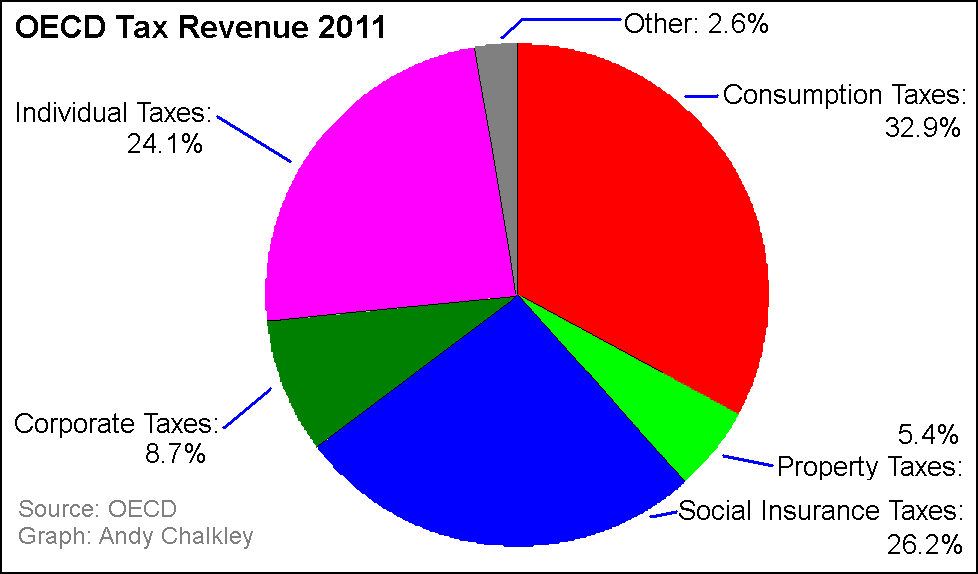
3: Introduce Taxes That do not Harm the Economy
Land Tax is a tax on the main natural resource of the nation. Land was created by nature or god (depending on your thinking) for all living things to share. Mankind has drawn lines on maps to give security of tenure. This has led to monopolisation, abuse and what I call the ‘usury of land’. Citizens use credit freely created by banks to purchase land and property which rapidly pushes land prices up to the limit of affordability. It is the affordability of the repayments to the moneylenders that determines the selling price of land. Land is essential to almost all activities and should not be monopolised by the portion of society with better access to finance. Land is extremely popular and citizens will pay high proportions of their income to obtain it. Land was provided free by nature for all living things to use in harmony. Our younger generation has been dispossessed of the opportunity to own land or property due to their lower income and educational debts. The young may be members of nation, but they will never own one square centimetre of it. A Land Tax would take the advantage away from speculators. Because land is of limited supply, it makes an excellent commodity on which to speculate. Land Tax takes the profit out of the speculative investment and returns useful revenue to the government. The Land Tax can further be used to reduce the pressure to maintain high Income Tax and Sales tax regimes that are damaging to the economy. Land tends to rise in value where there is employment. Where there is no employment, land prices are low. Land prices rise as the local amenities improve. As roads, bridges, water, and transport are improved, the surrounding areas become more suitable for business and home building. None of the improvement costs were borne by the landowner. But the landowner makes gains in asset appreciation and increased rental incomes as a result of others outlays. The value of land is not intrinsic to the land but in the ability to share the surrounding resources. Much of the expenditure on the surrounding infrastructure was borne by the government. The title holders of land have the duty to pay taxes to government for the gains. Land with no local amenities has no value. The value of land lies in its proximity to other facilities including employment. A visit to Detroit taught me all about the relationship between available employment and land prices.
We will be richer, more active and freer with it. Every Australian citizen should be able to enjoy the freedom, independence, and privacy of land ownership. It is effectively the birthright of all Australians to be a participant in the ownership of their homes. [Read more on this topic at: https://www.prosper.org.au/2015/03/30/treasury-unearths-a-beautiful-tax/#sthash.hAoBamCV.dpuf]
A letter from Clyde Cameron regarding land revenue was sent to Hon Frank Crean when he was the Treasurer. Clyde Cameron had already developed a dislike for Treasury in 1973 over wage policy, because Treasury wanted the Labor Government to continue with the same hard line against wage rises as the previous Liberal-Country Party Government:
“The reintroduction of a Federal tax upon unimproved land for non-rural properties in excess of 100 thousand dollars unimproved land value, and a special tax upon any taxpayer owning more than his place of residence and one vacant block. As well as yielding several hundreds of millions of dollars in revenue, this tax would have the even greater advantage of easing pressure on resources caused by the rapacity of land speculators. It would reduce land values by taxing vacant building allotments and would be much more equitable than seeking to reduce demand inflation by such measures as, say, indirect taxation upon consumer goods and household appliances. Rising land prices have a greater inroad into the incomes of the ordinary wage earner than any other single factor. It not only directly affects the wage earner who is seeking to build a new home, but it directly affects the price of homes already built… You will recall that when the Menzies Government abolished the Federal Land Tax, the Labor Opposition then stated, quite categorically, that a Labor Government would reintroduce the tax.” [1]
Land Tax can be considered to be a charge to supply local government services. Land Tax tends to ensure that land is only held when it is going to be productive. Land hoarding will cease. Other taxes on employment and production tend to stifle enterprise. Land will tend not to sit idle ensuring that land is rented or put to good use. Land Tax is difficult to avoid and is fair and efficient. Land values reflect the toil of the citizens over centuries to create the local infrastructure and should not be used for gain by current titleholders. It is an appropriate area for taxation for numerous reasons.
A tax on financial transactions, known as a “Tobin” tax, could protect superannuation investors, improve the operation of Australia’s capital markets and provide a source of tax revenue of over $1 billion per year, according to a policy brief from The Australia Institute. Tobin taxes or some form of financial transaction tax are in effect in over a dozen jurisdictions internationally, including UK, France, Italy, Hong Kong and South Africa.
A Transaction Tax should be implemented on all transactions at about $1 per $1000 (0.1%) or less. This is much less than the current sales tax of $100 per $1000 and income tax of about $300 per $1000. Individuals already pay private transaction fees to banks on general transactions and credit card transactions at a higher rate than would be charged by a Transaction Tax. The Transaction Tax is same as a Robin Hood Tax except that it is applied to all transactions.
It is better to tax that which occurs naturally. Taxes should have a higher bias toward taxation of land and resources. These taxes are more difficult to avoid, are less damaging to the real economy and tend to reduce speculation.
The value of this wealth tax needs more study that I have time for but it could be as low as $1 in $1000 (0.1%) on assets. (A millionaire would pay $1000 per annum wealth tax.)
Demurrage Tax is a tax on the holding of money. It is a tax on anyone who holds money out of circulation. Tax on Hoarded Money is called Demurrage Tax and would commonly be a small monthly tax on money holdings at a low rate of between $1 in $1000 (0.1%) and $10 in $1000 (1%). It would apply to holdings above $1000 held for more than one month. It would be removed from bank accounts monthly. To stop persons screaming, just remind them that income tax will be reduced by far more than this amount and sales tax will be reduced to 0% for almost all items. (Sales will stay for chewing gum and jet fuel)
In historical times, rulers often renewed their currency every few years with periods between two and eight years. Over 150 years, Anglo-Saxon and early Norman rulers changed the design of their coinage at least 53 times. [2]
Rev. Henry Swabey “Much has been made of these bracteates of late, as well as of tallage – a medieval tax on coinage – on the ground that they prevented hoarding. The man with money was at no advantage over the man with perishable wares, and so the velocity of circulation was speeded. Yet only a few of this kind of Demurrage Money have been found, owing, doubtless, to their friability. Tallage, the other device that speeded the circulation of money and prevented hoarding, was imposed from 1140 onwards in England and elsewhere. The holder of coins would be eager to pass them on to avoid the tax.” [11]
The power of money lies in its ability to create transactions. Using it as a store of value is counter productive and destructive to its primary purpose. This is the primary imperfection of money. When money is used as ‘a store of value’ it is not lubricating transactions and has thus ceased to act as money. I have a very neat way of making the citizenry more affluent by charging a neat little tax. It is called a Demurrage Tax. It is a very small tax that discourages hoarding and makes money move much faster which makes everyone more affluent by more than the tax. I always thought that was the cleverest tax. A tax that makes you better off. The Demurrage tax is a small monthly tax on money holdings which encourages people to spend rather than hoard so they pay less of the economy-damaging income and sales taxes and get much higher benefit from the greater flow of money. You will need Demurrage tax of some kind in your perfect solution. It will be an unpopular medicine that is needed to correct the misuse of money.
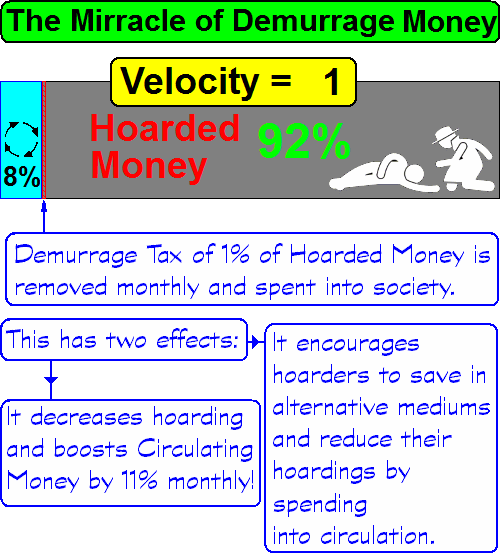
There is a need to reduce individuals income tax to 0% for about one-third of taxpayers. The income tax form will need to contain a wealth tax component and also a saved (hoarded) money component. Each taxpayer should receive a work expenses allowance of perhaps $2000 to reduce tax paperwork. Earned income will need to be taxed at a lower rate than unearned income.